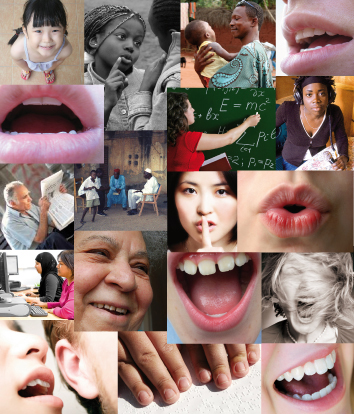 CULTURE
CULTUREA Pillar of Cultural Diversity
Languages, with their complex implications for identity, communication, social integration, education and development, are of strategic importance for people and the planet. Yet, due to globalization processes, they are increasingly under threat, or disappearing altogether. When languages fade, so does the world’s rich tapestry of cultural diversity. Opportunities, traditions, memory, unique modes of thinking and expression – valuable resources for ensuring a better future are also lost.
 |
||
| © UNESCO/RR | ||
News
Events
The International Mother Language Day, proclaimed by the General Conference of UNESCO in November 1999, has been observed yearly since February 2000 to promote linguistic and cultural diversity and multilingualism.
The eleventh International Mother Language Day, on 21 February 2010, will be celebrated in the framework of the International Year for the Rapprochement of Cultures.
On the occasion of the Day, an International Symposium on Tanslation and Cultural Mediation is organized on 22 and 23 February 2010.
Message from Ms Irina Bokova, Director-General of UNESCO, International Mother Language Day (in pdf)
The International Mother Language Day, proclaimed by the General Conference of UNESCO in November 1999, has been observed yearly since February 2000 to promote linguistic and cultural diversity and multilingualism.
It originated as the international recognition of Language Movement Day, which has been commemorated in Bangladesh since 1952.
The tenth International Mother Language Day on 21 February 2009 also provides an opportunity to recall the objective of this celebration to Member States: the recognition of linguistic diversity and the importance of multilingual education.
For more information:
- Message from Mr Koïchiro Matsuura, Director-General of UNESCO, on the occasion of International Mother Language Day 2009
- Programme of the Day
- International Mother Language Day Poster
- Languages in Education
A conference organised by the Multilingualism Sector, Directorate-General for Translation of the European Commission.
This bilingual conference (FR/EN) will aim to give a broad overview of the mother tongue issue and its practical impact on language learning and language use in businesses.
The speakers will be Dr Laurence Mettewie, who contributed to Rudi Janssens’ study on the use of languages in Brussels, and her colleague Luk Van Mensel.
They will question the relevance of the mother tongue concept and explore the European Union's language policy with the help of concrete examples.
They will focus in particular on linguistic attitudes as an incentive or an obstacle to learning languages in bilingual communities and on multilingualism as an asset or a constraint for businesses.
In the framework of International Mother Language Day and the International Year of Languages, the UIL was one of four UNESCO partners – in cooperation with the German Technical Cooperation (GTZ) – behind the organization of an International Seminar on Literacy of Indigenous Youth and Adults held in Guatemala from 11 to 13 February 2008.
Drawing on studies carried out in their respective countries, researchers from seven Latin American countries – Brazil, Bolivia, Ecuador, Guatemala, Mexico, Nicaragua and Peru – met to discuss both the current literacy situation of indigenous populations and effective literacy practices in multicultural and multilingual contexts. The event’s participants included the Minister of Education from Guatemala, Ms Ana Ordóñez de Molina, and several NGOs, universities and other stakeholders.
Documents
Banner and mosaic
© UNESCO/Maro Haas
Picture n°1
© iStockPicture.com/Jason Stitt
Picture n°2
© iStockPicture.com/Eva Serrabassa
Picture n°3
© iStockPicture.com/Andrea Gingerich
Picture n°4
© iStockPicture.com/Stila Goh
Picture n°5
© Marja Flick-Buijs
Picture n°6
© iStockPicture.com/Peeter Viisimaa
Picture n°7
© Nara Vieira da Silva Osga
Picture n°8
© Nara Vieira da Silva Osga
Picture n°9
© Maarten Uilenbroek
Picture n°10
© iStockPicture.com/Fanelie Rosier
Picture n°11
© Julia Freeman-Woolpert
Picture n°12
© iStockPicture.com/Chris Schmidt
Picture n°13
© iStockPicture.com/Arash James
Picture n°14
© Jimi Backhouse
Picture n°15
© iStockPicture.com/Satu Knape
Picture n°16
© Mike Manzano
Picture n°17
© iStockPicture.com/Karin Lau
Picture n°18
© iStockPicture.com/Oleg Prikhodko
Picture n°19
© Julia Freeman-Woolpert
Picture n°20
© UNESCO/Sergio Santimano
Picture n°21
© UNESCO/German Solinis
General Assembly proclaims 2008 International Year of Languages, in effort to promote Unity in Diversity, Global Understanding (GA/10592)
© 2008 - UNESCO